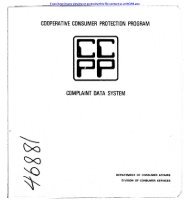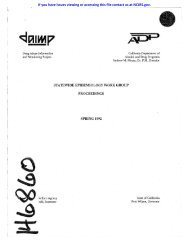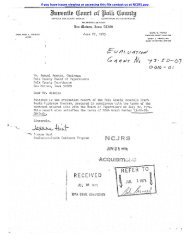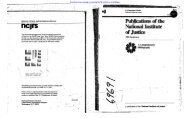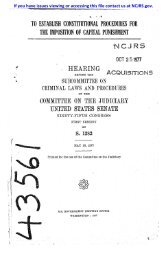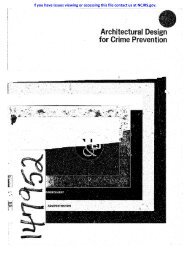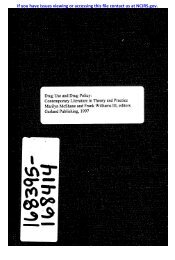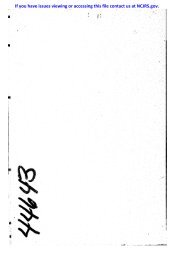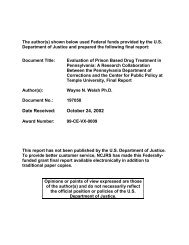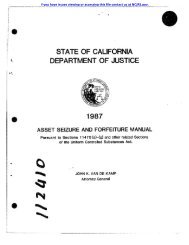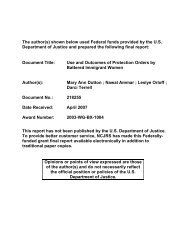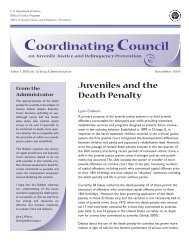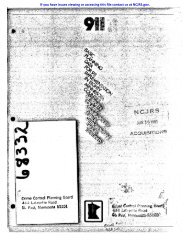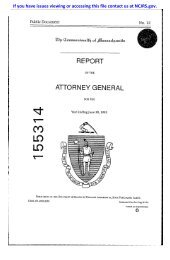Conflict Resolution Education - National Criminal Justice Reference ...
Conflict Resolution Education - National Criminal Justice Reference ...
Conflict Resolution Education - National Criminal Justice Reference ...
You also want an ePaper? Increase the reach of your titles
YUMPU automatically turns print PDFs into web optimized ePapers that Google loves.
I’ve seen changes in some of the kids at<br />
school since we started this program. They<br />
look at things differently now. They don’t act<br />
the same; they try to be more peaceful now.<br />
I think we are really changing the gangs on<br />
this campus. There used to be a lot of gangs<br />
before, writing in the bathrooms and all<br />
that, but it’s sort of stopped. It’s more<br />
peaceful now.<br />
Ninth grade student, Vista, California<br />
RCCP developed the curriculum in collaboration<br />
with participating teachers. It provides effective<br />
teaching strategies on the elementary, middle, and<br />
high school levels. Curriculum themes include peace<br />
and conflict, communication, affirmation, fostering<br />
cooperation, working with feelings, negotiation and<br />
mediation, appreciating diversity, bias awareness,<br />
countering bias, peacemakers, and envisioning a<br />
positive future. Some individual skills integrated into<br />
these themes include active listening, perspective<br />
taking, dealing with anger, assertiveness, win-win<br />
negotiation, understanding cultures, and avoiding<br />
expressions of bias.<br />
RCCP encourages teachers to set aside 30 to 45<br />
minutes at least once a week throughout the school<br />
year for a specific workshop in conflict resolution<br />
prepared from the curriculum guide. Teachers also<br />
integrate conflict resolution lessons, strategies, and<br />
skills into the regular academic program.<br />
Peer Mediation<br />
The school must implement the RCCP curriculum<br />
for at least a year before beginning peer mediation.<br />
Peer mediation reinforces the emerging problemsolving<br />
skills students learn through the curriculum.<br />
The students and teachers select a cadre of students<br />
representative of the school’s diverse cultures and<br />
backgrounds to be peer mediators. Once trained,<br />
elementary students take turns being “on duty”<br />
on the playground during recess. Wearing special<br />
mediator T-shirts and working in teams with their<br />
adult advisors nearby, they help students talk out<br />
their disputes. Middle school and high school peer<br />
43<br />
mediators do not work on the playground but listen<br />
to disputes in a room designated for mediation.<br />
Administrator Training<br />
Training is provided for administrators to introduce<br />
the concepts of conflict resolution and bias awareness<br />
and encourage them to embrace and model<br />
the humane and creative approaches to dealing with<br />
conflict that teachers are implementing through the<br />
classroom curriculum.<br />
Parent Training<br />
Parents participate in a 12-hour training in the skills<br />
and concepts of conflict resolution and intergroup<br />
relations so they can make their homes more peaceful<br />
and help their children become adept at using<br />
the conflict resolution skills learned at school. As<br />
they learn ways of dealing with conflict and prejudice<br />
at home, they become more effective leaders<br />
in their schools and communities. Parents may<br />
become trainers of other parents by participating<br />
in a district-level 60-hour training program.<br />
The primary impetus for starting the program<br />
in my school was to reduce violence, but<br />
it goes beyond that because there is a<br />
strong preventive measure. By teaching<br />
conflict resolution skills, we’re creating an<br />
environment that says it’s OK to have anger<br />
and conflict, which are a natural part of<br />
life. We’re saying that you can have these<br />
emotions and these conflicts and not have<br />
violence, which our culture glamorizes.<br />
Principal, Brooklyn, New York<br />
Illinois Institute for Dispute<br />
<strong>Resolution</strong><br />
The Creating the Peaceable School (CPS) program<br />
of the Illinois Institute for Dispute <strong>Resolution</strong><br />
(IIDR—see also chapter 3, page 27) focuses on<br />
applying conflict resolution principles to school<br />
and classroom management in order to encourage



